SUMMARY
This is AI generated summarization, which may have errors. For context, always refer to the full article.
![[Only IN Hollywood] ‘Expats’ director Lulu Wang praises Filipinas Ruby Ruiz and Amelyn Pardenilla](https://www.rappler.com/tachyon/2024/03/Screenshot-2024-03-06-at-4.31.33-PM.png)
LOS ANGELES, USA – “Yes but as soon as I saw her (Ruby Ruiz), we all knew she was the one immediately. If you’ve seen the show, she brought all of that – all the warmth, all of the emotion, and I felt like that she was going to be the heart and soul of the expat community.”
That’s Lulu Wang, creator and director of Expats, the series now streaming on Amazon Prime Video, answering my question about how she cast Filipina actress, Ruby, via her Zoom audition and the self-tape the latter sent.
As the nanny in the Woo family (headed by Nicole Kidman and Brian Tee), Ruby is truly affecting as the series’ “heart and soul,” with her tender, subtle yet moving portrayal.
The actress, whose credits include films like Iska and Ma’Rosa and teleserye projects, auditioned for the Triangle of Sadness role that went to Dolly de Leon. Ruby has reportedly landed international roles as a result of the buzz about her performance in Expats.

Ruby and another Pinay actress, Amelyn Pardenilla, and the main cast of Expats – Nicole (Margaret), who is also one of the miniseries’ producers, Saraya Blue (Hilary), Ji-young Soo, Brian, Tiana Gowen, Bodhi del Rosario (Filipino-Puerto Rican), and Jack Huston – are earning praise in the six-episode drama limited series which is also getting good reviews.
I asked Lulu about Ruby and Amelyn during the Q&A in the recent Lulu Wang and Expats: Storytelling on a Large Canvas, part of Film Independent’s filmmaker conversation series, Directors Close-Up.
Held at the Directors Guild of America, the panel, moderated by filmmaker Karyn Kusama (Yellowjackets, Girlfight) also featured Expats producer Dani Melia and production designer Yong Ok Lee.

Set in 2014, as the Umbrella Movement protests rage in Hong Kong, Expats is based on Janice Y.K. Lee’s 2016 novel, The Expatriates. While it tackles the lives of several affluent expatriates in HK, Lulu made it a point to go deeper into the other perspective, that of the domestic workers, as reflected by the characters, Essie (Ruby) and Puri (Amelyn).
Lulu, who directed The Farewell (her sophomore feature), for which Awkwafina won the 2020 Golden Globe best actress-comedy or musical trophy, continued recounting how she cast Amelyn, a Cebuana singer who has been performing in HK’s top hotel bars for over two decades.
“Amelyn was in Hong Kong. She auditioned in person. We said, we need to really be open and we’re not only looking for actors, let’s look at singers, let’s do like an open casting call to anybody who might be interested as a Filipina in Hong Kong because at that time, we only had the budget to cast locally and didn’t want to fly in another person internationally.”
“So Amelyn came in and sang and she’s like, ‘Well, I’ve never acted.’ [I said,] ‘I don’t care, we’ll figure that out. Like your voice is so amazing.’”
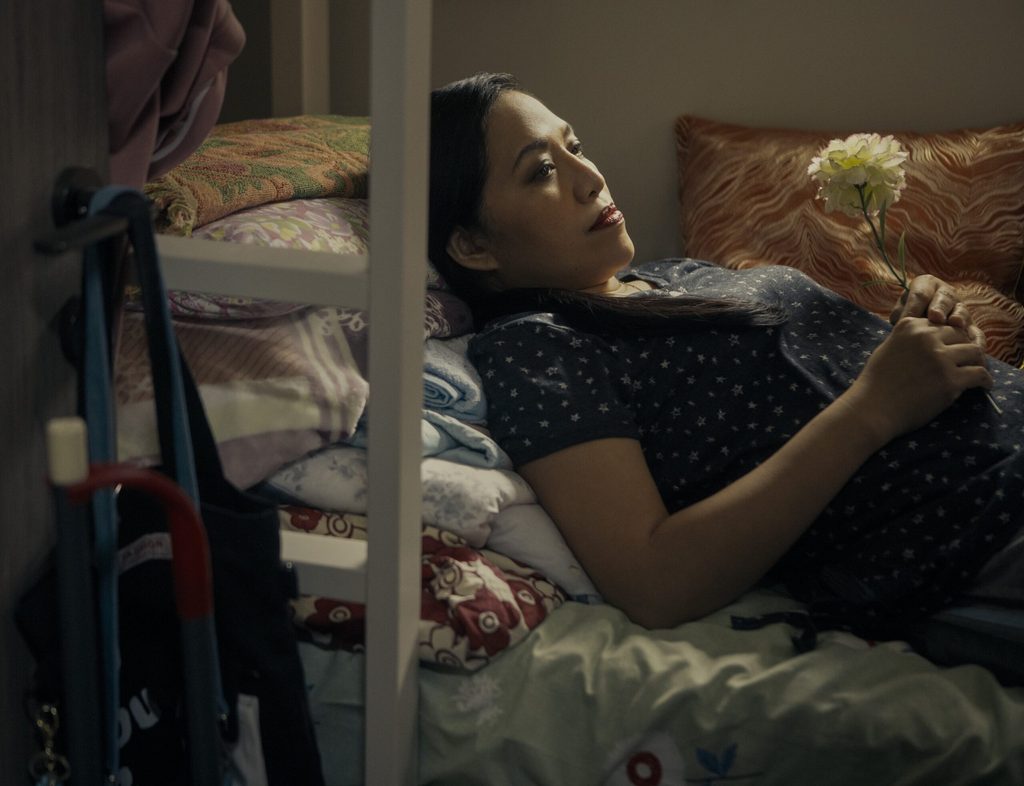
Lulu made excellent choices in Ruby and Amelyn, who are being cited by critics along with Nicole, Sarayu, and the rest of the cast.
The Wrap raved, “By the end of the episode, Margaret and Hilary each find themselves in deeply vulnerable moments with Essie and Puri, respectively. ‘You’re a good friend,’ Hilary tells Puri. ‘You’re family,’ Margaret tells Essie.”
“But what the devastating ending to the episode (five) — which is elevated by the subtle heartbreak in Pardenilla and Ruiz’s magnificent performances — reveals is this pseudo-bond that people like Margaret and Hilary create for themselves: to see their help as family, not only out of a sense of class guilt, but also because of the convenience that it brings them.”
Chicago Sun-Times, which also hailed Ruby’s performance as “magnificent,” wrote: “Expats contains some stunning twists and turns, but this is much more of a character study than a mystery.”
“Nicole Kidman delivers searing work as Margaret, who is consumed with pain that is taking her to a place from where she might never return, and her work is matched by the performances of Sarayu Blue, Ji-young Yoo, Ruby Ruiz, Brian Tee, and Jack Huston.”
“Each of these actors is given showcase moments in which their stories are front and center, and there’s never a false note in their respective performances. Expats is a richly layered, beautifully photographed, and profoundly affecting work.”
Lulu explained how she worked with a cast with varying degrees of experience and yet elicited uniformly compelling performances.
“We had a range of different types of actors,” she began. “We had like obviously Nicole and then we had Amelyn who plays Puri. She is a singer in Hong Kong, never acted before, and she was incredibly nervous.”
“Ruby is from Manila and she’s well-known in the Philippines. She’s incredible and everything she does is immediately real and lived in.”
“And then Sarayu and Brian have been around – veteran actors – but have never done roles of this size and this centered. Sarayu, in particular, does a lot of network comedy, and so she was like, ‘Oh, it’s a drama, like how big, what’s the size?’”
“That was the biggest challenge – making sure everybody felt like they were in the same movie.”
Asked specifically how she made the cast comfortable despite their different backgrounds, Lulu answered, “I tried as much as I could to make them feel as valued as possible and tried to take the Hollywood-ness of it out and make them feel like equals as much as possible. Obviously, there was a lot of nerves.”
“But we were all so close because we were there for so many months and so we would go to dinners together. We all spent a lot of time together and I think that helped.”
“No, we didn’t have time to rehearse but I just told which characters, which people to spend time with, and then which ones not to,” Lulu replied about rehearsals before the filming in HK and then LA.
“Like I kept Ji-young Yoo, who plays Mercy, and Nicole separate from each other because when they were shooting their scene, they were strangers. They meet a couple of times and that’s it, in the story, and yet they’re connected by this huge incident.”

Episode five, which highlights Ruby and Amelyn’s characters, is the series’ arc. Lulu said, “The episode flips the perspective from the expats to the locals, the side characters, and people who are domestic workers because Hong Kong has this society of live-in help.”
“And a lot of the women are from different parts of Southeast Asia and so the helpers in this series are from the Philippines. So I said, we can’t do a show about women without this other perspective. And then it puts into perspective and context these expats, and you get a different perspective of them.”
“And so, I thought, there’s no way Amazon and Nicole are going to let me do a 90-something-minute episode where Nicole doesn’t even show up until halfway in.”
Lulu added about this fifth episode which was shown at the Toronto International Film Festival: “And I said, I want to go to festivals with this. I want this to be the first thing that people see, at least, a certain audience.”
“So, all of these things, I just thought, okay, I’m just going to tell her these impossible things, and she’ll say, ‘In the future, we’ll work together.’ But instead, she called me back, like, 24 hours later, and said, ‘Ok, it’s yours.’”
On expanding Janice’s novel and opening it beyond the lives of the expats, a world of luxury and entitlement, Lulu explained, “There was some level of that, for sure, in the novel. One of my requirements was that Janice Y.K. Lee, who wrote the novel, had to be in the writers’ room with us.”
“And so, with her blessing, we expanded on that because I wanted to even more…for example, Essie and Puri are characters in the book. They’re domestic workers, known as helpers in Asia, who live with them (expats).”
“I wanted to really go deeper into their perspective, just to challenge this balance between both emphasizing…take Nicole’s character, Margaret, she’s the character who is the greatest victim because she’s the one who has the tragedy happen to her.”
“So, here’s a person, the worst thing in the world happens to this mother but she’s also the most entitled and privileged. And being able to have that polarity in this one character was what grounded us.”
“And then we would try to look for that polarity with every character. Not as extreme. I think Margaret’s the most extreme and challenging audiences to see if she can hold both empathy and disdain.”
As for giving full humanity to Essie and Puri’s stories, and the dichotomy between the upper and working classes living in HK, as the small yet rich nation is rocked by protests, Lulu shared, “There were no politics in the book. And that was important to me. That was another thing I said to Nicole – I can’t make this series without touching on politics.”
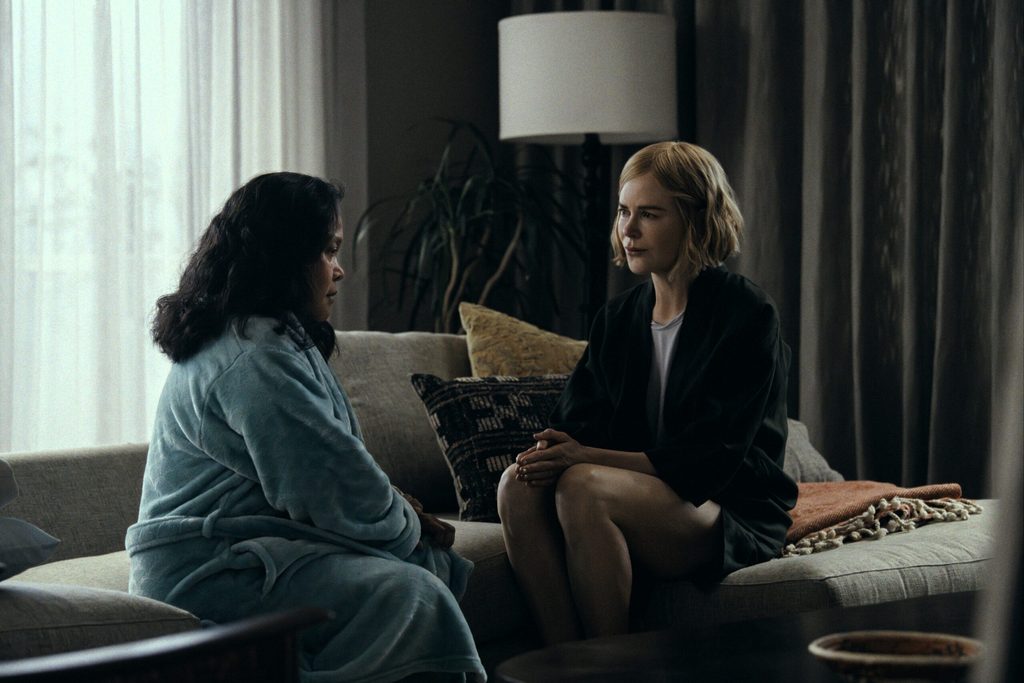
“As somebody who is Chinese-American, who left Beijing as a child, my silence would be incredibly loud. And I thought about that.”
“A Western filmmaker might be able to make something in Hong Kong and not touch on politics. And they might get some criticism or somebody might point that out. But to some degree, it’s not their world, right? So, it’s like, all right.”
It could have been the other filmmakers’ excuse, Karyn commented.
“Exactly, they themselves are expats,” Lula responded. “And of course, I am an expat in Hong Kong but I’m also not. I’m also an immigrant from China.”
“And the parallel of my experience leaving Beijing and what’s happening in Hong Kong – so I can’t not address this. And that was a tricky thing because I didn’t want it to be a backdrop. But it’s also, we’re not making a political show.”
Expats, which prides itself in having women in front of and behind the camera, also boasted of an all-female writers’ room.
“I had never even been in a writers’ room so I think in some ways that was good because I didn’t know how it’s supposed to be done,” Lulu admitted. “And I’ve also never collaborated with other writers before.”
With a laugh, she quipped, “So, my instinct was just like, we all get in a room and they order us lunch. That was the best part. Plenty of food around.”
“It’s just a magical time really because we were just like, okay, what do you love about the book? What are the elements? I love this line; I love this character.”
“So, we just talked a lot from there and then I provided the structure. I went in knowing it was going to be six episodes, the fifth was penultimate. Let’s put another bottle episode in there somewhere.” (Vulture’s Kathryn VanArendonk described a bottle episode this way: “In the purest, earliest definition, a bottle episode is a TV money-saving strategy, an attempt to make an episode with the least amount of budget required.”)
“I also knew that the first episode should start a year later because that’s how the book is structured. You come in not knowing. It’s not linear like something has happened.”
Lulu agreed with Karyn’s remark that the episode plays like a mystery. “Exactly and I like the intrigue of that, as opposed to coming in and just going right into a narrative. And then the second episode is a year earlier, and we, in a very linear way, tell you exactly what happened then.”

“So those two are kind of companion pieces, like here’s the question, and then here’s the answer. So, we had that structure and then we brought in Gursimran Sandhu (writer) because I knew that Hilary is written as white – I think British – in the book.”
“And I wanted to tackle themes of colorism in Asia, in East Asia. Gursimran is Sikh American and was writing very specifically for that character. So, a lot of times it was like therapy.”
“We would just talk about our own lives and stories and see what would stick. And it wasn’t necessarily always like, we have to keep going, we have to break story. It was a very loose structure.” The other writers, aside from Lulu, Janice, and Gursimran, are Alice Bell and Vera Miao.
“Some days we would come in and we would just talk about events in the world and how we were feeling and somehow that would shape and color what went in. And that’s what I’m most proud of.”
“I think it’s very much like a series about the inner lives, the emotional lives of women in a way we don’t get to see very often.”
Lulu, who asked my wife Janet and me after the panel if the Tagalog dialogue was accurate (yes, it’s realistic), volunteered that the Expats production sought the advice of consultants to ensure authenticity.

“We were working with local crew in Hong Kong, like as much as possible, especially because a lot of the material, or some of the material, especially in the fifth episode, deals with local politics,” she said. “So, both within the Filipino community, having advisors helping to make sure that that was all completely authentic was important to us.”
Dani recounted how she and Lulu collaborated again on Expats. “Lulu and I had worked together on The Farewell. At that time, I was working as an employee at a producing and financing company. So that was how we met.”
“I was working for the financiers and we hadn’t officially started our company together. We had dreams of starting a company together, Lulu and me. And this was something that she was able to identify as, I think I want this to be my next thing.”
Turning to Lulu, Dani continued, “I’m putting a writers’ room together. I’m going to develop the scripts and read the book. As the scripts come in, I’d love your feedback, and then we’re going to figure out how to bring you on the project as a producer.”
“That was one of the things Lulu mentioned – that she had a list of requirements to take the project on, and one thing that Lulu was able to do and fought hard for was to bring on Anna (Franquesa-Solano), our cinematographer, and Yong, our production designer, and me, and one of our editors.”
“We had a lot of the same team that we had done The Farewell with – the composer and music supervisor, a few others.”
“We talked a lot about the transition from a small feature to a big series like this, and how a lot of directors are plucked from the festival world and put onto huge projects without the support of the people who work with them to make the thing that is what the studio executive identified. So, that was important to us, to be able to preserve that as much as possible.”
Lulu described the hurdles: “I think that we were able to largely execute it despite a lot of production challenges. The time that we were shooting in during the pandemic and being an international production.”
“So, despite those challenges, I feel like we all love the scripts so much and Amazon loved the scripts. That was our North Star. We would come back and just say this is how it has to be done.”
“And of course, there are moments in which it’s like, well, this is so challenging, can we cut this? Can we do that? And that is so much of the process – to make sure that you hold on to what’s important.”
I learned in the conversation that many of the key sets had to be built from the ground up. And get this, some of the sets were built twice – for the filming first in HK and then LA.
Lulu explained, “We have only done mostly practical locations, and there is a real loyalty to that, and since we were coming from independent film because there’s just nothing more real than the real thing.”
“You don’t want to be that Western production that comes in and builds everything and then there’s an artificiality. So, we were really resistant to building.”
“We started off by doing a lot of scouting and then found that, in particular for the expat community, the apartment complexes, everything that we looked at, even though they were luxury apartments in real life, don’t necessarily read that way.”
“And you have all of these restrictions because you’re in a building where people are actually living. So, you can’t really move them out. And then a lot of stuff, even though it’s luxury, it’s because it’s by the beach but it’s not as polished, so it wouldn’t necessarily read as lux.”
“And so that’s when we said, okay, well, the idea of the expats’ world is that it’s a bubble. And there is an artificiality to it. So maybe the fact that we make that the only build, the only set, will actually work for us.”
“But of course, we have to make sure that it looks as realistic as possible. So, we ended up doing a ton of research, and Yong and Anna thought a lot about this set build because they both wanted it to look real. We looked at a lot of references and so often you can see the artificiality.”
“I also want to say it’s incredible because Yong had to build this set twice. We built the Star apartment first in Hong Kong and the Woo apartment on a stage in LA and it’s all the same.”
“A lot of it has to look the same because it’s in the same complex. And so, there was also a lot of conversation about you don’t want two identical apartments and build it because from a line producer perspective to save money, you’d be like, just use the same apartment and put in different furniture.”
“But that’s not how those things work. Depending on where you are in the building, the layout is slightly different. And so, we were like, okay, it has the look of the same building but this one has a dining room when you enter, this one has a living room, and then having to tear it down and build it again.”
Yong added, “Originally, we wanted to build an apartment in Hong Kong. So, we started Hilary’s apartment. When my team and I designed it, we considered, are we going to recycle this set for the Woos’ apartment?”
“So we needed to transform it easily, even though the Woos’ apartment and the hallway set in Hong Kong, we decided to build the Woos’ apartment and hallway set in LA. And there are lots of challenges because it’s not just a different layout but also the material.”
“Because when we were in Hong Kong, I was able to use all real materials, like luxury marble, wood, and everything because it’s easy to import from China at a very cheap cost. But when we are back in LA, there’s no way we can get the same material but it should be the same.”
“So, every element I have to match. And so, it was really hard to recreate this.”
Asked what this team learned, Dani answered, “We did learn a lot. It was such a big scale compared to anything we’ve worked on before, and longer, and more people involved. That’s one thing I learned a lot like I said, 10 times.”
“The one thing that was amazing to me with a production of this size, and then therefore a cast that was so big from so many different places around the world. We brought people in from the Philippines and Australia, and then from Hong Kong, and then we shot some here (Los Angeles).”
“And also, crews from around the world, like a super international crew. So many people from different walks of life coming together.”
“What I learned is the importance of creating an environment where everyone cares and loves each other and hangs out outside of work.”
“It was a really special moment in time because we were in Hong Kong in a time when, because we all had to quarantine for three weeks, we were able to sort of be out in the world in the middle of COVID because they didn’t have a big COVID issue.”
“So, we were in a little safety bubble ourselves. And I think that bonding and having real relationships with everyone in your project and fostering that community is really important.”
For her part, Lulu said, “We learned a lot. I’ve never worked on something of this size and the length of time. So, to keep the stamina was challenging. And then having so many external factors threatened.”
“The instinct I had was at the end of this, it doesn’t matter what happened. If I’m not proud of the work, if the final result doesn’t reflect my vision, it’s not going to matter. It’s still my name.”
“And so, the most important thing to me, like, I didn’t care about (but) I had to negotiate politics and relationships. That’s always challenging in this industry but I just kept saying to them, this is my name, and I can’t put out something that I don’t believe in.”
“And so, when we finished, that was the thing that I was the proudest of, that we were all proud of the work; it reflected our vision and it didn’t get diverted.”
Expats certainly has Lulu’s stamp and name on it and it’s a great follow-up to her acclaimed The Farewell. Season 2, please. – Rappler.com
Add a comment
How does this make you feel?
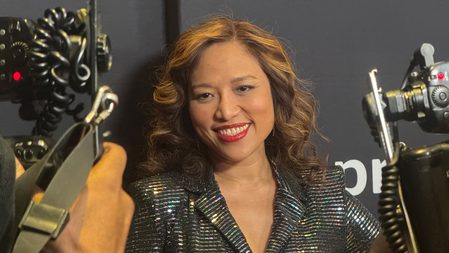
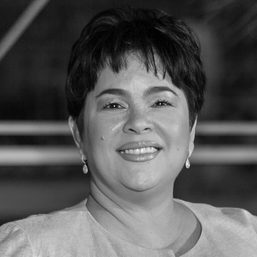
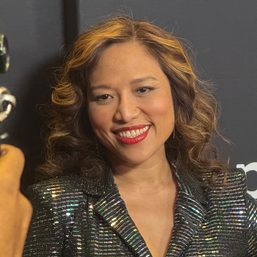
![[Only IN Hollywood] Dolly de Leon on her 2 Sundance films, ‘Nine Perfect Strangers,’ next projects](https://www.rappler.com/tachyon/2024/01/Screenshot-2024-01-24-at-5.23.06-PM-1.png?resize=257%2C257&crop=221px%2C0px%2C717px%2C717px)

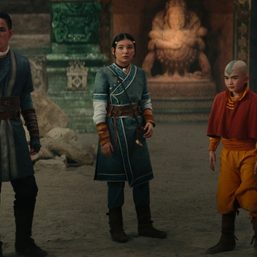
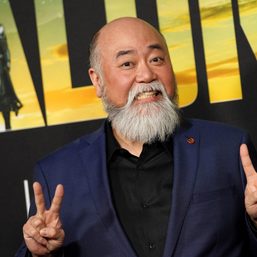
![[Only IN Hollywood] Jodie Foster on ‘True Detective: Night Country’ – her 1st TV show in almost 50 years](https://www.rappler.com/tachyon/2024/01/TrueDetectiveNightCountryJodieFosterReflectsOnHerLongAndSuccessfulCareerIt-has-been-a-long-fantastic-adventure.CreditHBO1.jpg?resize=257%2C257&crop=388px%2C0px%2C1280px%2C1280px)
There are no comments yet. Add your comment to start the conversation.